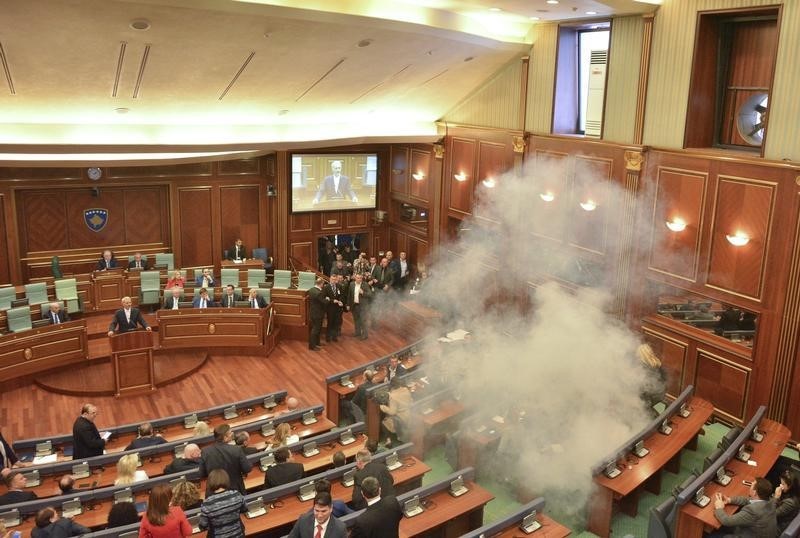
- All Instrument Types
- Indices
- Equities
- ETFs
- Funds
- Commodities
- Currencies
- Crypto
- Bonds
- Certificates
Please try another search

Protests in Kosovo ahead of parliament's vote on border deal
 © Reuters. Tear gas is released during a session of parliament in Pristina
© Reuters. Tear gas is released during a session of parliament in Pristina
By Fatos Bytyci
PRISTINA (Reuters) - A lawmaker set off tear gas in Kosovo's parliament and someone threw a hand grenade at an official's house on Tuesday before a vote on a border deal that is the last hurdle to visa-free access to the European Union.
Some deputies rushed out of a committee room when an opposition politician opened the tear gas canister. The others approved a government report on the border demarcation deal with Montenegro while the acrid fumes were still in the air.
Other protesters hurled stones at a government building nearby in the latest outburst of violence against several reforms. They say the deal would require Kosovo to hand over 8,000 hectares (20,000 acres) of territory to Montenegro.
Local media said parliament may vote on the border deal on Thursday. The opposition has threatened to stop it by all means.
Driton Caushi, a member of the largest opposition party, opened the tear gas canister during a meeting of a parliamentary committee reviewing the border proposal. There have been similar acts by other opposition MPs inside parliament in recent months.
"As long as there is a criminal government in Kosovo that betrays the national interests, no one should hope that opposition resistance will be over," Caushi said as he was handcuffed and led away by police.
A hand grenade was later thrown at the house of the head of the government commission that drew up the border deal with Montenegro, police said. The grenade did not explode and a bomb squad detonated it in a controlled blast.
Kosovo and its biggest supporters, the United States and the European Union, deny that Pristina would lose land in the border deal, as the opposition claims, and say the proposed agreement with Montenegro is in line with international and local law.
"I can guarantee that Kosovo is not losing a single centimeter of its land," Prime Minister Isa Mustafa told a news conference.
Kosovo is well behind its regional neighbours Serbia, Albania, Montenegro, Macedonia and Bosnia, who obtained visa-free access to the EU's border-free Schengen zone in 2010.
Opposition to the border deal has been fierce in Kosovo. Tensions have been exacerbated by an earlier EU-brokered accord with its northern neighbour Serbia giving more autonomy to Serb-dominated municipalities in the small state of 1.8 million.
Kosovo declared independence in 2008, nearly a decade after NATO air strikes drove out Serbian security forces that were accused of killing and expelling ethnic Albanian civilians during a counter-insurgency war. Kosovo's independence is now recognized by more than 110 countries, although not by Serbia.
Related Articles
Are you sure you want to block %USER_NAME%?
By doing so, you and %USER_NAME% will not be able to see any of each other's Investing.com's posts.
%USER_NAME% was successfully added to your Block List
Since you’ve just unblocked this person, you must wait 48 hours before renewing the block.
I feel that this comment is:
Thank You!
Your report has been sent to our moderators for review






Add a Comment
We encourage you to use comments to engage with users, share your perspective and ask questions of authors and each other. However, in order to maintain the high level of discourse we’ve all come to value and expect, please keep the following criteria in mind:
Perpetrators of spam or abuse will be deleted from the site and prohibited from future registration at Investing.com’s discretion.